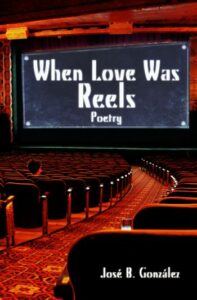
Arte Público Press Author José B. González featured on Houston Public Media
Houston Public Media radio host Eric Ladau interviewed Chacón for its website’s “Arte Público Press Authors” feature, and along with the transcript, their conversation is available to listeners on the station’s interactive site through on-demand audio streaming here.
Click here to see all Arte Público authors featured on Houston Public Media.
About the Author:
JOSÉ B. GONZÁLEZ was born in San Salvador, El Salvador, and immigrated to New London, Connecticut, at the age of eight. He is the author of the poetry collection, Toys Made of Rock (2015), based on his journey from a non-English speaker to a professor of English. He is the coeditor (with John S. Christie) of Latino Boom: An Anthology of US Latino Literature (2006). A nationally known speaker, González has presented at various colleges all over the world and at institutions including the National Smithsonian Museum of African Art and the National Smithsonian Museum of the American Indian. He has been a contributor to National Public Radio and his poetry has been published in Quercus Review, Callaloo, Acentos Review, and Colere, among others. He has also been featured on Univision and the nationally syndicated show American Latino TV. A Fulbright scholar, González teaches Latino literature, creative writing, Latin American literature, and composition and speech courses at the US Coast Guard Academy in New London, Connecticut. He is the founder and editor of LatinoStories.com and a member of the Macondo Writers Workshop.
About his new book, When Love Was Reels: Poetry

 “My parents crossed when I started losing / teeth. My memory of them is broken, chipped / away.” Expressing his longing not to be forgotten like so many abandoned children in his native country, José B. González writes about a young boy’s life—first in El Salvador under the care of his grandmother and later living with his uncle in New York City—in this moving collection of narrative poems that uses iconic Latin American and Latino films as a guiding motif.
“My parents crossed when I started losing / teeth. My memory of them is broken, chipped / away.” Expressing his longing not to be forgotten like so many abandoned children in his native country, José B. González writes about a young boy’s life—first in El Salvador under the care of his grandmother and later living with his uncle in New York City—in this moving collection of narrative poems that uses iconic Latin American and Latino films as a guiding motif.
In each poem, famous movie and TV scenes featuring icons likes Pedro Infante and Cantinflas, and modern stars such as Elizabeth Peña, Edward James Olmos, and Esai Morales are juxtaposed with important moments in the boy’s life. In the first section, “Scenes from the Golden Age,” the boy watches classic Latin-American films from the ‘30s, ‘40s, and ‘50s at the cinema with his grandmother in El Salvador. In a 1948 film, he notes the difference between a maid, who “stands straight like the board on which she irons the family’s clothes,” and his grandmother, who “drags each leg like a broken broom,” her shoulders “heavy, like a stack of irons.” He imagines how once she must have been strong, raising her son, urging him to resist “the hungry promises of dreams.”
In the second section, “Scenes from El Norte,” he moves to New York, “where the screens / will not be black and white.” There his uncle leaves him in the apartment to watch TV and learn English. The boy writes to his grandmother, but doesn’t tell her “how / I swallow my screams / how I watch alone.” Later, he and his friends use spray cans to tag Brooklyn buildings, and that paint saves them, keeping them “from / believing / in blades, / guns and / knives.” Providing a tribute as well as a criticism of the way that film and television portray Latino lives, the collection is also notable for shedding light on the lives of so many youths raised by grandmothers in Latin America as the generation in-between went in search of the American Dream. These poems hauntingly illuminate Salvadoran immigration to the United States.




